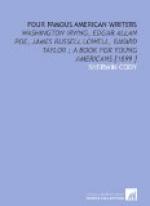It happened at last that a weekly paper called the Saturday Visiter was started in Baltimore. To give the paper popularity, two prizes were offered, one of a hundred dollars for the best short story, and the other of fifty for the best poem. Poe tried for both. He had six short stories, which he copied in a neat little manuscript volume entitled “Tales of the Folio Club.” The poem he sent was “The Coliseum.”
The judges were well-known gentlemen of the city of Baltimore, one of whom, John P. Kennedy, afterward became Poe’s intimate friend. When they met they looked over several stories, which did not interest them very much. They then came to the “Tales of the Folio Club.” One was read aloud, and the three gentlemen were so much interested that they kept on till they had read all, and at once decided to give the prize to one of these. They chose Poe’s famous story “A MS. Found in a Bottle.” Afterward they decided that his poem was the best submitted; but noticing that it was in the same handwriting as the stories, they thought it best to give the prize to another. When they made their report they greatly complimented the stories Poe had sent in, and said they should be published in a volume.
We have said that one of the judges, Mr. Kennedy, became Poe’s friend. To show how very poor Poe was, I copy this passage from Mr. Kennedy’s diary: “It was many years ago that I found Poe in Baltimore in a state of starvation. I gave him clothing, free access to my table, and the use of a horse for exercise whenever he chose; in fact, I brought him up from the very verge of despair.”
Here, too, is an extract from a letter from Poe to Mr. Kennedy:
“Your invitation to dinner has wounded me to the quick. I cannot come for reasons of the most humiliating nature—my personal appearance. You may imagine my mortification in making this disclosure to you, but it is necessary.”
Mr. Kennedy did all that a friend could do for the future poet and story-writer. Says Poe: “He has been at all times a true friend to me—he was the first true friend I ever had—I am indebted to him for life itself.”
Poe now contributed regularly to the Saturday Visiter, its young editor, Lambert A. Wilmer, becoming his friend and constant companion. It is said that at this time he dressed very neatly, though inexpensively, “wore Byron collars and a black stock, and looked the poet all over.”
CHAPTER VII
POE’S EARLY POETRY
We have seen how persistently Poe clung to his poetry. Three times he published the little volume of his verses, revising, enlarging, and strengthening. In those days there was no market for poetic writing, and as Poe wrote in a strange, weird style, it is not remarkable that no one took any notice of the contents of his little volumes. It was his own opinion, however, that these early poems contained more real poetic imagination than his later successes, and it is perhaps as well that we should begin our study of Poe with some of the first fruits of his genius.




